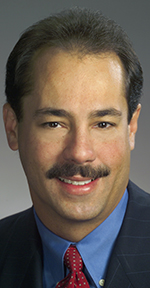Kent Sharkey, a licensed psychotherapist and CEO of Ulliance, a Troy-based company that provides employee assistance programs, spoke with DBusiness Daily News about the importance of supporting mental health in the workplace.
1. DDN: How has the death of Robin Williams had an impact on the workload at Ulliance?
KS: Since Robin Williams’ death (on Aug. 11), we’ve seen a spike in employees and management personnel contacting us that are feeling suicidal. We’re so busy day-to-day — buying groceries, being at work, and attending school functions — we don’t really think about the reality of emotional pain. But whenever a personality or somebody famous takes their life or engages in substance abuse or something like that, it gets our attention. (It prompts) the public to become more aware of depression and public health issues.
2. DDN: How prevalent is depression?
KS: According to the University of Michigan Depression Center, nearly 1 out of every 5 adults suffers from some form of depression. It can be temporary, chronic, postpartum, or manic-depressive, and it costs about $83 billion a year. And it can be very expensive for employers. People that experience depression have higher disability claims, higher work compensation claims, higher absenteeism, and their performance deteriorates just by the natural of the disease.
3. DDN: What does Ulliance’s employee assistance program do?
KS: Our programs deal with a lot of different types of work-life challenges that employees and their families might go through. They can be as serious as somebody who’s suicidal or something as minor as somebody trying to locate elder care for their aging mother. But 52 percent of the people that we see — and we cover about 800,000 people throughout the United States, Canada, and Mexico — (are using services) related to emotional health, things like depression and anxiety.
4. DDN: Have you noticed a change in perspective by employers regarding employee assistance programs over the years?
KS: Employee assistance programs have been around for about three decades, and I’ve noticed that employers are much more in tune or aware (than they used to be). It’s taken some time, but employers are now starting to realize that an employee’s personal issues often times become performance and workplace issues. Research shows that if you experience depression, this (can manifest itself physically), so you might start to overeat or under eat or start to self medicate with alcohol or other mood altering substances, which brings on other issues.
With the escalating costs of health care, employers have started to look at wellness programs, asking, “How can we be preventative?” Because it’s much easier and less costly to address smaller issues (than it is when they evolve into) big issues.
5. DDN: Is this something employers can handle internally?
KS: I often joke around and ask, “Who’s the company psychologist?” And it’s usually the HR director, which can be dangerous, because well-intentioned advice can sometimes backfire on you. There’s a high level of liability associated to HR people distributing psychological advice because they don’t have malpractice insurance or the education (needed) for the role.
Editor’s note: An earlier version of this article said the company covers about 8,000 people throughout North America. The correct number is 800,000.






